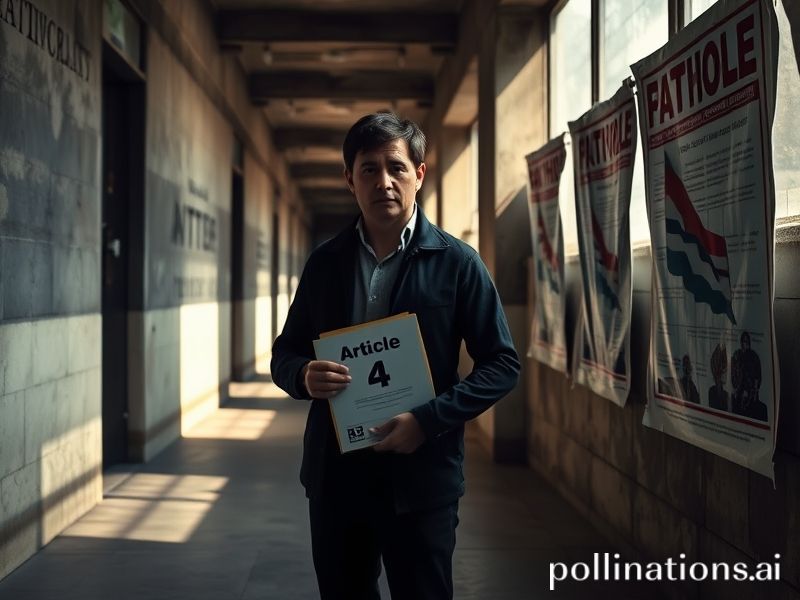Article 4: The Tiny Treaty Clause That Lets the World Cheat at Solving Everything
**Article 4: The Fine Print That Keeps the World Spinning (and Occasionally Imploding)**
GENEVA—Tucked between the glossy brochures of global governance lies Article 4, that unassuming clause in the International Treaty on [Insert Acronym Here] which diplomats invoke at 3 a.m. when the can has been kicked so far down the road it’s technically in a different time zone. You’ve never read it—frankly, neither have most presidents—but it is the duct tape holding the international order together, right up until the moment it becomes the ripcord for mutually assured PR disaster.
Article 4, for the uninitiated, is the diplomatic equivalent of a “get out of jail, kind of” card. It allows signatories to plead “special circumstances” when fulfilling their treaty obligations becomes politically suicidal. Think of it as a worldwide prenup: everyone signs with starry-eyed optimism, fully aware the escape hatch will be needed once the honeymoon subsidies dry up. In climate accords, it’s the clause that lets nations promise net-zero while quietly booking extra runways at Glasgow. In trade pacts, it’s the fine print that turns “free market” into “free-ish, depending on next quarter’s soybean harvest.” And in collective-defense treaties, it’s the paragraph that translates “an attack on one is an attack on all” into “thoughts, prayers, and a strongly worded communique, pending parliamentary recess.”
The beauty of Article 4 is its culturally adaptive vagueness. Brussels calls it “flexibility mechanism.” Washington calls it “national-interest safeguard.” Beijing simply refuses to translate it, citing “internal readability guidelines.” The Kremlin used to call it something unprintable, then invoked it twice and now insists the treaty never existed. Meanwhile, the Global South nods politely, having seen this episode before—usually right before IMF conditions apply.
Global implications? Oh, just the small matter of whether multilateralism survives the decade or we all revert to 19th-century spheres of influence with better Wi-Fi. Every time a government triggers Article 4, a UN intern gets carpal tunnel updating the “Days Since Last Norm Violation” whiteboard back to zero. The carbon counters in Geneva tally another 0.2 °C on the existential thermostat. Supply-chain managers in Singapore add another red row to the spreadsheet titled “Unexpected Sovereign Twist.” And somewhere in the blogosphere, a think-pivoter coins the phrase “Article 4 moment,” which beats actually fixing things.
Still, one must admire the elegant cynicism baked into the system. Article 4 acknowledges that domestic politics will always trump international commitments—then institutionalizes that trumping with embossed letterhead. It is honesty in sub-clause form, the legalistic shrug that says, “We’ll try, but voters have the attention span of a fruit fly on TikTok.” Without it, no treaty would ever be signed; with it, every treaty becomes a high-stakes game of musical chairs where the music is lobbyist cash and the chairs are made of recycled promises.
Predictably, the world’s autocrats adore Article 4: it gives them a rhetorical riot shield against pesky NGOs. Surprisingly, populists love it too—nothing whips up a base like blaming foreigners for the very loophole you insisted on inserting. Only the small island states hate it, because when your country is literally sinking, “flexibility mechanism” sounds a lot like “learn backstroke.”
So here we are, orbiting yet another summit where leaders will praise the “rules-based order” while privately stapling Article 4 waivers inside their national briefings. The planet warms, markets wobble, alliances ossify, and the clause count grows longer than a German coalition agreement. But fear not: the moment catastrophe tips from probable to inconvenient, some diplomat will produce a crisp copy of the treaty, point to an asterisk only three people understand, and declare victory for multilateral pragmatism. The rest of us will shrug, update our doom-scrolling apps, and book front-row seats to the next installment of “Civilization: Terms and Conditions May Apply.”
In the end, Article 4 isn’t a loophole; it’s a mirror—reflecting every electorate’s desire to have its cake, eat it, and export the carbon credits. The joke, as always, is on whoever still believes fine print is optional. The rest of us knew the price of admission the moment we stopped reading past page four.







